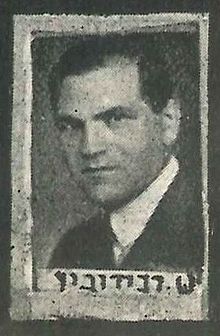Simon Rawidowicz
Simon Rawidowicz | |
|---|---|
 Rawidowicz in 1926 | |
| Born | 1896 Grajewo, Poland |
| Died | 1957 Waltham, Massachusetts, U.S. |
| Occupation | Philosopher |
| Spouse | |
| Relatives | Alfred Klee (father-in-law) Hanneli Goslar (niece) |
Simon Rawidowicz (1896–1957) was a Polish-born American Jewish philosopher.
Early life
Simon Rawidowicz was born in 1896 in Grajewo, Poland to Chaim Yitzchak Rawidowicz (later Ravid), a Zionist activist, a travelling merchant, a writer, and a pioneer farmer, and to Chana Batya (née. Rembelinker). A second of ten children – seven of whom survived childhood – he studied at the modern Yeshiva at Lida. Rawidowicz received a traditional Jewish education, during the course of which he became attracted to the Haskalah and Modern Hebrew literature.[1] He was drawn to the reviving Hebrew language and literature, and before turning 18 he became a teacher at the Cheder Metukan.[2] He was educated in Germany.[3] 1933 he emigrated to the United Kingdom.
He married Esther Klee in 1926, the daughter of Alfred Klee and the maternal aunt of Hanneli Goslar (Anne Frank's best friend).[citation needed]
Career
Rawidowicz taught at the Jews' College in London and at the Leeds University (as of 1941). In 1948 he emigrated to the United States, first teaching at the College of Jewish Studies of Chicago. Rawidowicz served as the chair of the Department of Near-Eastern and Judaic Studies at Brandeis University.[3][4] He was the author of several books and essays, some of which were published posthumously.
Rawidowicz was a critic of Zionism.[5] In his essay entitled Between Jew and Arab, he suggested that early Arab refugees in Israel were treated differently from Jews as early as 1948.[5] In The Ever-Dying People, he argued that each generation of Jews was afraid of extinction.[6][7]
Death
Rawidowicz died of a heart attack in 1957 in Waltham, Massachusetts.[4][8]

Works
- Rawidowicz, Simon (1952). The Chicago Pinkas. Chicago, Illinois: College of Jewish Studies. OCLC 2922981.
- Rawidowicz, Simon (1974). Studies in Jewish Thought. Philadelphia, Pennsylvania: Jewish Publication Society of America. ISBN 9780827600577. OCLC 1255999.
- Rawidowicz, Simon (1986). Ravid, Benjamin C. I. (ed.). Israel, The Ever-Dying People, and Other Essays. Rutherford, New Jersey: Fairleigh Dickinson University Press. ISBN 9780838632536. OCLC 13185419.
Further reading
- Myers, David N. (2008). Between Jew & Arab: The Lost Voice of Simon Rawidowicz. Waltham, Massachusetts: Brandeis University Press. ISBN 9781584657361. OCLC 227929293.
References
- ^ Skolnik, Fred (2007). Encyclopedia Judaica (PDF) (Second Edition, Volume 17 ed.). Keter Publishing House. p. 125. Retrieved 2022-08-25.
- ^ Ravid, Benjamin (1986). The Life and Writing of Simon Rawidowicz. in: Simon Rawidowicz (1986): Israel, The Ever Dying People and Other Essays (Benjamin C.I. Ravid, Ed.).: Associated University Presses Inc. p. 12. ISBN 0-8386-3253-X. Retrieved 2022-08-25.
{{cite book}}: CS1 maint: location (link) - ^ a b Sachar, Abram Leon (1995). Brandeis University: A Host at Last. Waltham, Massachusetts: Brandeis University Press. p. 204. ISBN 9780874515817. OCLC 32243102.
- ^ a b "Jewish Philosopher Dies". The Plain Speaker. Hazleton, Pennsylvania. July 22, 1957. p. 4. Retrieved July 12, 2016 – via Newspapers.com.
- ^ a b Magid, Shaul (March 11, 2009). "What You Must Think About Zionism". Forward. Retrieved July 12, 2016.
- ^ Himmelfarb, Milton (September 30, 1990). "Should Jews Criticize Israel?". The New York Times. Retrieved July 12, 2016.
- ^ Freedman, Samuel G. (2000). "Prologue". Jew vs. Jew: The Struggle for the Soul of American Jewry. New York: Simon & Schuster. ISBN 9780684859446. OCLC 44414300 – via The New York Times.
- ^ "Deaths". Oshkosh Daily Northwestern. Oshkosh, Wisconsin. July 22, 1957. p. 7. Retrieved July 12, 2016 – via Newspapers.com.
